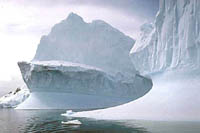Air warming above Antarctica
The air over Antarctica is warming even faster than in other parts of the world, according to an analysis of 30 years of weather balloon data.

While surface warming has been reported in parts of Antarctica, this is the first report of broad-scale climate change across the whole continent, the British Antarctic Survey says in Friday's issue of the journal Science.
The weather balloon data show a warming of 0.9 degree to 1.3 degree Fahrenheit (0.5 degree to 0.7 degree Celsius) per decade over the last 30 years. By contrast, the average worldwide temperature has risen 0.2 degree (0.1 degree Celsius) per decade in that time, according to the paper.
Detailed records from the weather balloons launched at nine stations around the continent, including Russian records, have only recently become available, the researchers said, reports AP.
According to MSNBC, "Greenhouse gases could be having a bigger impact in Antarctica than across the rest of the world, and we don't understand why," said John Turner of the British Antarctic Survey.
Other studies of the region focused only on surface temperature variations and produced mixed results. One study found significant warming only on the western side of the Antarctic Peninsula but not elsewhere in the southernmost continent.
Another previous study even suggested that parts of Antarctica were cooling in recent decades while the rest of the globe was warming.
Unlike these other studies, the current one looks at temperature variations away from the Earth's surface and also covers a wider area.
Analyzing nearly continuous data collected from nine weather stations over the past 30 years, the researchers concluded that Antarctica's air is indeed heating up.
Turner warned that the warming could affect Antarctica's snowfall and sea level in ways not predicted by current models.
"Current climate model simulations don't reproduce the observed warming, pointing to weaknesses in their ability to represent the Antarctic climate system," he said. “Our next step is to try to improve the models."
O.Ch.
Subscribe to Pravda.Ru Telegram channel, Facebook, RSS!


